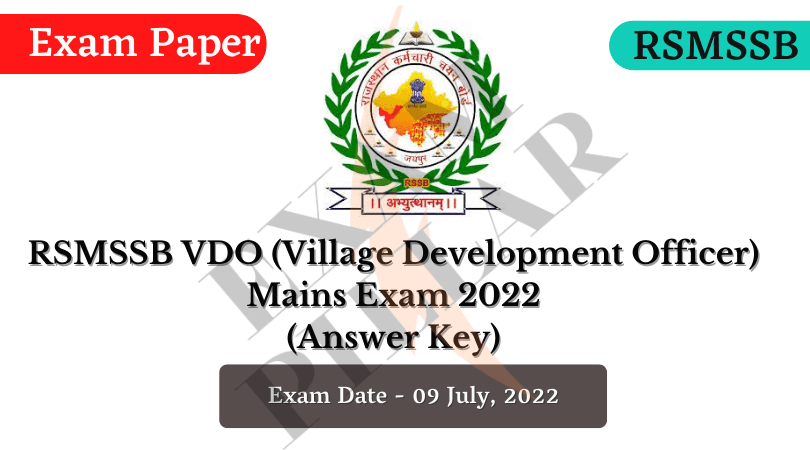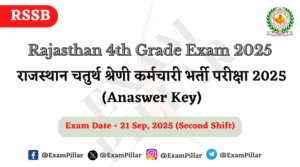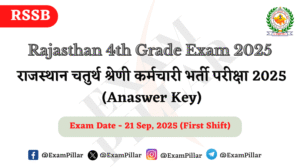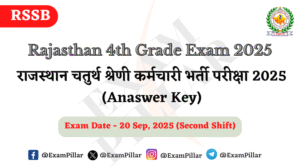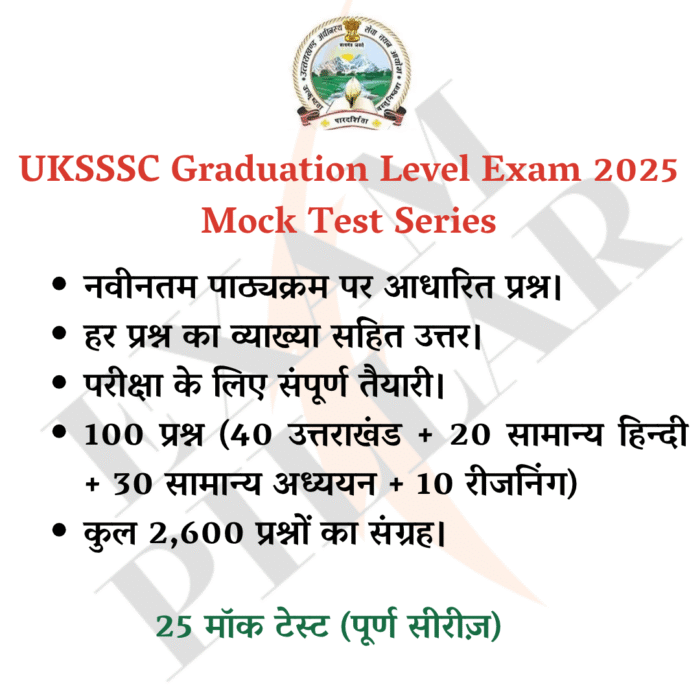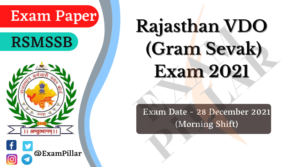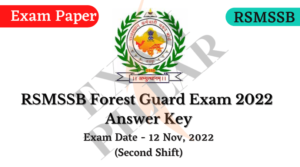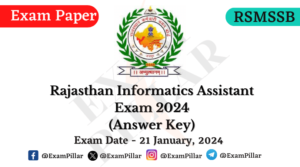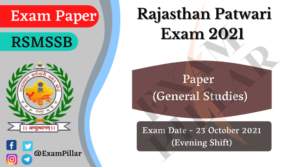21. निम्नलिखित सूची-I के वाक्यांशों को सूची-II के शब्दों के साथ सुमेलित कीजिए –
| सूची-I | सूची-II |
| (A) नीचे की ओर लाना या खींचना | (i) अनादूत |
| (B) जो बिना बुलाए आया हो | (ii) अन्तेवासी |
| (C) किसी वस्तु को प्राप्त करने की तीव्र इच्छा | (iii) अपकर्ष |
| (D) गुरु के समीप रहने वाला विद्यार्थी | (iv) अभीप्सा |
(A) (A)-i, (B)-iii, (C)-iv, (D)-ii
(B) (A)-iii, (B)-iv, (C)-ii, (D)-i
(C) (A)-i, (B)-ii, (C)-iii, (D)-iv
(D) (A)-iii, (B)-i, (C)-iv, (D)-ii
Show Answer/Hide
22. संधि की दृष्टि से कौनसा युग्म अनुचित है?
(A) मात्रिच्छा – यण स्वर संधि
(B) मनश्चिकित्सा – विसर्ग संधि
(C) तल्लीन – व्यंजन संधि
(D) स्वागत – दीर्घ स्वर संधि
Show Answer/Hide
23. व्याकरण की दृष्टि से निम्न में से कौनसा शुद्ध वाक्य है?
(A) वह बड़ा अच्छा खिलाड़ी है।
(B) भोपाल में अनेक तालाब हैं।
(C) माता जी का मन गद्गद हो गया।
(D) समय के साथ शब्द लोप हो जाते हैं।
Show Answer/Hide
24. कौन से शब्द युग्म का अर्थ भेद सही है?
(A) कृति-कृती – निपुण-रचना
(B) डीठ-ढीठ – निडर-दृष्टि
(C) तरणि-तरुणी – युवती-सूर्य
(D) अयश-अयस – अपकीत्ति-लोहा
Show Answer/Hide
Read the passage carefully and answer the questions given below –
The choice we make on a daily basis – wearing a seatbelt, lifting heavy objects correctly or purposely staying out of any dangerous situation – can either ensure our safety or bring about potentially harmful circumstances.
You and I need to make a decision that we are going to get our lives in order. Exercising self-control, self-discipline and establishing boundaries and borders in our lives are some of the most important things we can do. A life without discipline is one that’s filled with carelessness.
We can think it’s kind of live life on the edge. We like the image of “Yeah! that’s me! Living on the edge! Woo-hoo!” It’s become a popular way to look at life. But if you see, even highways have lines, which provide margins for our safety while we’re driving. If we go over one side, we’ll go into the ditch. If we cross over the line in the middle, we could get killed. And we like those lines because they help to keep us safe. Sometimes we don’t even realize how lines help to keep us safe.
25. The phrase “Potentially harmful circumstances” refers to circumstances that can –
(A) Certainly be dangerous
(B) Be fairly dangerous
(C) Be possibly dangerous
(D) Seldom be dangerous
Show Answer/Hide
26. What does the author mean when he says, “To get our lives in order”?
(A) To resume our lives
(B) To organize our lives
(C) To rebuild our lives
(D) To control our lives
Show Answer/Hide
27. Synonym of the word ‘carelessness’ is –
(A) caution
(B) laxness
(C) vigilance
(D) heedfulness
Show Answer/Hide
28. Match the sentences in column (A) with appropriate prepositions in column (B) –
| Column (A) | Column (B) |
| (A) My mother is afraid ______ cats. | (i) for |
| (B) If you want permission you must apply ______ the Principal. | (ii) of |
| (C) We must all pray ______ peace. | (iii) at |
| (D) The crowd threw stones ______ the police. | (iv) to |
(A) a-(ii), b-(iv), c-(iii), d-(i)
(B) a-(iii), b-(ii), c-(iv), d-(i)
(c) a-(ii), b-iv), c-(i), d-(iii)
(D) a-(i), b-(iii), c-(iv), d-(ii)
Show Answer/Hide
29. Choose the appropriate alternative from the given options that comes closest to the idea conveyed by the sentence “You must be back within two hours.”
(A) You are likely to be back within two hours.
(B) You are obliged to be back within two hours.
(C) You have the option to be back within two hours.
(D) You have to be back within two hours.
Show Answer/Hide
30. Fill in the blank with the correct option – They know that extremists blew up the bridge. (Change into Passive voice)
(A) They know that the bridge was blew up by extremists.
(B) It is known that the extremists blown up the bridge.
(C) It is known that the bridge was blown up by the extremists.
(D) It is known that the bridge would be blown up by the extremists.
Show Answer/Hide
31. Which set of words fits well into the given sentence? He pretended to fall ______ my plan but secretly he was working against it.
(A) off through
(B) in for
(C) in with
(D) into by
Show Answer/Hide
32. What is the correct sequence of phrases –
this document (P)/ as proof of his guilt (Q)can we take (R) on the table (S)
(A) RSPQ
(B) PSRQ
(C) RPSQ
(D) QPRS
Show Answer/Hide
33. Which of the following is not the meaning of ‘bound’?
(A) to build a boundary
(B) to spring or leap
(D) to be controlled by a condition or law
(C) to be restrained by a material such as rope
Show Answer/Hide
34. Match the words in column I to their antonyms in column II –
| Column-I | Column-II |
| (A) conceal | (i) ascetic |
| (B) hedonist | (ii) permanent |
| (C) hackneyed | (iii) reveal |
| (D) ephemeral | (iv) original |
(A) a-(iv), b-(i), c-(iii), d-(ii)
(B) a-(iv), b-(iii), c-(i), d-(ii)
(C) a-(iii), b-(iv), c-(i), d-(ii)
(D) a-(iii), b-(i), c-(iv), d-(ii)
Show Answer/Hide
35. In the sentence – “Kalidas is the Shakespeare of India.” – the definite article ‘the is used because
(A) Shakespeare’ is a proper noun used as a comparative.
(B) ‘Shakespeare’ is a singular noun used to make general statement.
(C) ‘Shakespeare’ is an adjective.
(D) ‘Shakespeare’ is a pronoun.
Show Answer/Hide
36. Choose the correct option –
He said, “My wife leaves for Vienna tomorrow”. (Change into indirect speech)
(A) He said that his wife have to leave for Vienna the next day.
(B) He said that his wife would leave for Vienna the next day.
(C) He said that his wife has to leave for Vienna tomorrow.
(D) He said that his wife had to leave for Vienna tomorrow.
Show Answer/Hide
37. The correct form of words in the brackets are –
We suggested (sleep) in hotels but the children were anxious (camp) out.
(A) to sleep, To camp
(B) for sleep, about camp
(C) sleeping, to camp
(D) that we sleep, camped
Show Answer/Hide
38. Match words in column I with their meanings in column II –
| Column-I | Column-II |
| (A) incongruous | (i) recover quickly from difficult situation |
| (B) resilient | (ii) one who knows everything |
| (C) obsolete | (iii) that which is no longer in use |
| (D) omniscient | (iv) strange and out of place |
(A) a-(i), b-(ii), c-(iii), d-(iv)
(B) a-(iv), b-(i), c-(iii), d-(ii)
(C) a-(iv), b-(iii), c-(ii), d-(i)
(D) a-(iv), b-(ii), c-(iii), d-(i)
Show Answer/Hide
39. Choose the part of the sentence you think is incorrect in the given sentence –
Nehru was one of the greatest statesmen who has led the Non-aligned Movement.
(A) Nehru was
(B) One of the greatest statesmen
(C) Who has led
(D) The Non-aligned Movement
Show Answer/Hide
40. Match the idioms in column I with their meanings in column II –
| Column-I | Column-II |
| (i) Call it a day | (A) saying good luck to someone |
| (ii) Feeling under the weather | (B) to leak a secret |
| (iii) Spill the beans | (C) not very well |
| (iv) Break a leg | (d) to stop work or another activity |
(A) i-(C), ii-(D), iii-(B), iv-(A)
(B) i-(D), ii-(C), iii-(B), iv-(A)
(C) i-(A), ii-(C), iii-(B), iv-(D)
(D) i-(D), ii-(C), iii-(A), iv-(B)
Show Answer/Hide

